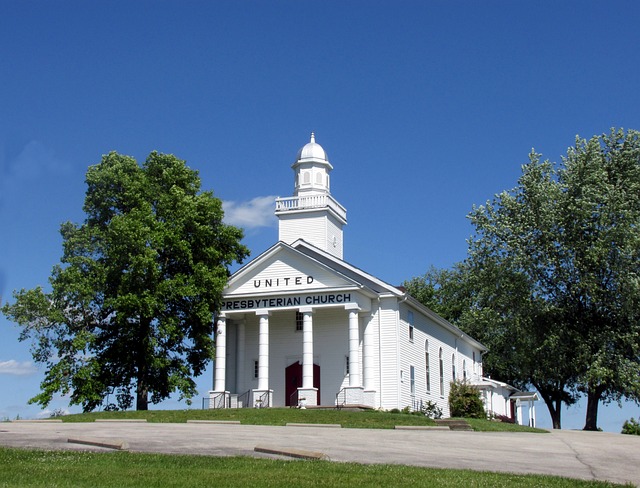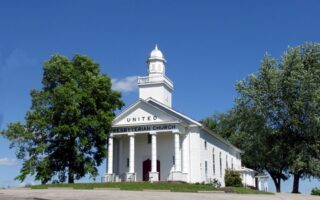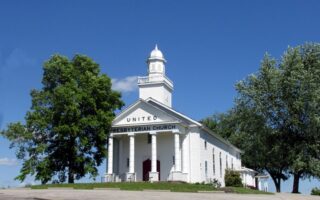Presbyterians do not typically pray for the dead.
Table of Contents
The Beliefs and Practices of Presbyterians Regarding Prayer for the Dead
Presbyterians, like many other Christian denominations, have their own beliefs and practices when it comes to prayer for the dead. While there is no one-size-fits-all answer to this question, it is important to understand the general stance of Presbyterians on this matter.
In Presbyterian theology, the focus is primarily on the salvation of souls and the belief in eternal life. The emphasis is placed on the idea that salvation is a personal relationship with God, and that it is through faith in Jesus Christ that one can attain eternal life. This belief is rooted in the teachings of the Bible, which Presbyterians consider to be the ultimate authority in matters of faith and practice.
Unlike some other Christian traditions, Presbyterians do not believe in the concept of purgatory. Purgatory is a place or state of purification where souls are believed to go after death to be cleansed of their sins before entering heaven. Instead, Presbyterians believe that upon death, believers go directly to be with the Lord in heaven, while non-believers face eternal separation from God.
Given this belief, the practice of praying for the dead in the traditional sense, as a means of helping them in their journey towards salvation, is not a common practice among Presbyterians. Instead, the focus is on praying for the living, that they may come to know and accept Jesus Christ as their Lord and Savior.
However, this does not mean that Presbyterians completely disregard the idea of praying for the dead. While it may not be a central part of their worship or liturgy, there are instances where prayers for the dead may be offered. For example, during memorial services or funerals, prayers may be said for the deceased, asking for comfort and peace for their loved ones left behind.
Additionally, Presbyterians believe in the communion of saints, which is the belief that all believers, both living and dead, are united in Christ. This belief acknowledges the ongoing connection between the living and the deceased members of the faith community. In this context, prayers may be offered to remember and honor the lives of those who have passed away, as well as to seek guidance and inspiration from their example of faith.
It is important to note that individual beliefs and practices may vary among Presbyterians. Some may feel a personal calling to pray for the dead, while others may not. Ultimately, the decision to pray for the dead is a matter of personal conviction and interpretation of scripture.
In conclusion, Presbyterians generally do not have a strong tradition of praying for the dead in the traditional sense. Their focus is primarily on the salvation of souls and the belief in eternal life through faith in Jesus Christ. However, prayers for the deceased may be offered in certain contexts, such as memorial services or funerals, as a way to remember and honor their lives. Ultimately, the decision to pray for the dead is a personal one, guided by individual beliefs and interpretations of scripture.
Historical Perspectives on Presbyterian Views on Praying for the Deceased

Presbyterianism is a branch of Protestant Christianity that originated in Scotland during the 16th century. Known for its emphasis on the sovereignty of God and the authority of Scripture, Presbyterianism has a rich history and a distinct set of beliefs. One question that often arises when discussing Presbyterianism is whether or not Presbyterians pray for the dead.
To understand the Presbyterian perspective on praying for the deceased, it is helpful to look at the historical context in which the denomination emerged. During the Protestant Reformation, many reformers, including John Calvin, rejected the Catholic practice of praying for the dead. They believed that salvation was a matter of faith alone and that the souls of the departed were already in their eternal destination, either heaven or hell.
This rejection of praying for the dead became a defining characteristic of Presbyterian theology. Presbyterians believe that salvation is a personal matter between an individual and God, and that once a person dies, their fate is sealed. Therefore, there is no need to pray for the dead, as their eternal destiny has already been determined.
However, it is important to note that Presbyterianism is a diverse tradition, and there are variations in beliefs and practices among different Presbyterian churches. Some Presbyterian denominations, particularly those with more Anglican or Catholic influences, may incorporate prayers for the deceased into their worship services. These prayers are often seen as a way to remember and honor the lives of those who have passed away, rather than an attempt to change their eternal fate.
In recent years, there has been a growing movement within Presbyterianism to reexamine the practice of praying for the dead. Some theologians argue that praying for the deceased can be a meaningful way to express love and concern for those who have died, even if their eternal destiny is already determined. They suggest that these prayers can serve as a way to comfort the living and to acknowledge the ongoing connection between the living and the dead.
While this perspective is not universally accepted within Presbyterianism, it highlights the ongoing theological discussions and debates within the tradition. Presbyterianism, like any religious tradition, is not static but evolves and adapts to the changing needs and beliefs of its members.
In conclusion, the question of whether Presbyterians pray for the dead is a complex one. Historically, Presbyterianism has rejected the practice of praying for the deceased, viewing it as unnecessary given their belief in the sovereignty of God and the finality of death. However, there are variations within the tradition, and some Presbyterian denominations may incorporate prayers for the deceased into their worship services. Additionally, there is a growing movement within Presbyterianism to reexamine the practice of praying for the dead, suggesting that it can be a meaningful way to express love and concern for those who have passed away. Ultimately, the question of whether or not Presbyterians pray for the dead is a personal and theological one, and individuals within the tradition may hold different beliefs and practices on this matter.
Exploring the Scriptural Basis for or against Praying for the Dead in Presbyterianism
Do Presbyterians pray for the dead? It’s a question that has sparked much debate and discussion among believers. To understand the stance of Presbyterians on this matter, it is important to explore the scriptural basis for or against praying for the dead in Presbyterianism.
Presbyterians, like many other Protestant denominations, place a strong emphasis on the authority of Scripture. They believe that the Bible is the inspired word of God and the ultimate guide for faith and practice. Therefore, any theological belief or practice must be grounded in biblical teachings.
When it comes to praying for the dead, Presbyterians generally do not engage in this practice. The primary reason for this is the lack of explicit biblical support for such prayers. Unlike in Catholicism, where praying for the dead is a common practice, Presbyterians do not find a clear mandate or example in the Bible to support this belief.
However, it is important to note that Presbyterians do believe in the resurrection of the dead and the hope of eternal life. They affirm the biblical teaching that those who have placed their faith in Jesus Christ will be raised to new life in Him. This belief is based on passages such as 1 Corinthians 15:20-22, which states, “But in fact Christ has been raised from the dead, the firstfruits of those who have fallen asleep. For as by a man came death, by a man has come also the resurrection of the dead. For as in Adam all die, so also in Christ shall all be made alive.”
Presbyterians also believe in the communion of saints, which is the belief that all believers, both living and dead, are united in Christ. This belief is based on passages such as Hebrews 12:1, which speaks of “a great cloud of witnesses” surrounding believers. While this belief acknowledges the connection between believers, it does not necessarily imply that prayers should be directed towards the dead.
Instead, Presbyterians focus on praying for the living. They believe that prayer is a means of communicating with God and seeking His guidance, comfort, and provision. They believe that prayer is a powerful tool for interceding on behalf of others and bringing their needs before God. Therefore, Presbyterians prioritize praying for the living and seeking God’s will in their lives.
It is worth noting that individual Presbyterians may have different personal beliefs and practices regarding praying for the dead. While the official stance of the denomination does not support this practice, there may be some individuals who choose to engage in it based on their own understanding of Scripture or personal convictions.
In conclusion, Presbyterians generally do not pray for the dead based on the lack of explicit biblical support for this practice. They prioritize praying for the living and believe in the hope of eternal life through Jesus Christ. While individual beliefs and practices may vary, the official stance of the denomination does not endorse praying for the dead.
Understanding the Role of Intercessory Prayer in Presbyterian Theology and its Implications for Praying for the Dead
Do Presbyterians pray for the dead? This is a question that often arises when discussing the role of intercessory prayer in Presbyterian theology. To understand the answer, it is important to delve into the beliefs and practices of Presbyterians when it comes to prayer.
Presbyterians, like many other Protestant denominations, place a strong emphasis on the authority of Scripture. They believe that the Bible is the inspired word of God and the ultimate guide for faith and practice. This belief shapes their understanding of prayer and how it should be approached.
In Presbyterian theology, prayer is seen as a means of communication with God. It is a way for individuals to express their thoughts, concerns, and desires to the Almighty. It is also a way to seek God’s guidance and ask for His intervention in various aspects of life. However, Presbyterians believe that prayer should be directed towards God alone.
This belief is rooted in the understanding that Jesus Christ is the only mediator between God and humanity. Presbyterians believe that through His death and resurrection, Jesus has opened the way for direct access to God. Therefore, they do not see the need for intermediaries, such as saints or departed loved ones, to intercede on their behalf.
This understanding of prayer has implications for the practice of praying for the dead. In Presbyterian theology, there is no biblical basis for intercessory prayer for those who have passed away. Instead, the focus is on praying for the living and seeking God’s guidance and comfort in times of grief and loss.
Presbyterians believe that when a person dies, their fate is sealed. They believe in the concept of eternal life, where individuals will either spend eternity with God or be separated from Him. Therefore, they do not see the need to pray for the dead, as their eternal destiny has already been determined.
However, this does not mean that Presbyterians do not remember or honor the memory of those who have passed away. They believe in the communion of saints, which is the belief that all believers, both living and dead, are united in Christ. They may hold memorial services or engage in acts of remembrance to honor the lives of those who have gone before them.
In conclusion, Presbyterians do not pray for the dead in the traditional sense of intercessory prayer. They believe that prayer should be directed towards God alone, as Jesus Christ is the only mediator between God and humanity. While they may remember and honor the memory of those who have passed away, their focus is on praying for the living and seeking God’s guidance and comfort in times of grief and loss. This understanding is rooted in their belief in the authority of Scripture and the concept of eternal life.
Conclusion
No, Presbyterians do not typically pray for the dead.


